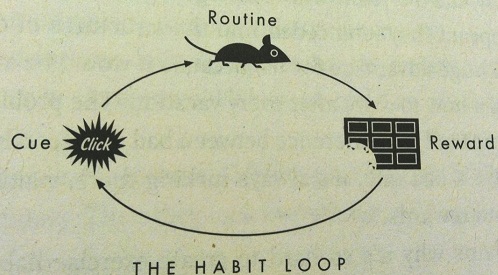Everyone has habits, some of them are beneficial, some are not. Habits like brushing our teeth, locking up our door before we leave the house, and pressing the brake pedal at red lights are good habits. Bad habits, like biting our nails, checking Facebook or Twitter incessantly while trying to complete a project, or reaching for your fourth Coca-Cola of the day just to stay awake, are all behavior patterns we could probably do without.
So if habits can be bad for us, why do we have them? Our brains form habits because they are constantly looking for ways to conserve energy and streamline our thinking patterns. Once the brain identifies a common behavior sequence, it programs itself to automatically activate the pattern of events every time a trigger (or “cue”) is switched.
Charles Duhigg, the author of The Power of Habit: Why We Do What We Do in Life and Business, believes that habits can be broken down into three key components: 1) A cue; 2) A routine; and 3) A reward.

Duhigg’s research indicates by making small modifications to one of the components (especially the cue and reward), it is very possible to end old patterns of behavior and begin new habits. He recommends that instead of simply willing ourselves into change, we should begin by assessing the cue, routine, and reward functions of the behavior. To understand how this works, let’s dig a little deeper into the model above.
The cue is the trigger that kicks your habit into motion. To identify the cue, begin keeping a journal of what’s going on just before your habit takes hold. Is it a certain time of day? A particular place/environment? An emotion? An email from your boss? A call from your mother-in-law?
The routine is the habitual action you want to modify; i.e., the cigarette you smoke after a heated discussion with your husband, the bag of potato chips you eat while watching your favorite TV show, etc.
The reward is the benefit you receive from your routine. This may be the trickiest one to identify, and what you discover may be very obvious or a little more subtle. For example, the reward someone receives when they go outside to smoke a cigarette might be to gain needed time alone to decompress, or if the cigarette break includes other people, maybe the reward is an opportunity connect with others. Rewards can also come in the form of avoidance of a task or activity, so in the cigarette example, maybe going outside for a cigarette gives you five minutes away from your annoying co-worker or the monotonous work day.
To begin new habits, consider how you could create your own cue. If you want to begin a habit of running after work, commit to putting on your running shoes when you get home. You may not begin to run at first, but at least you’ve started a new sequence of events. If you want to begin preparing dinner at home instead of stopping by McDonalds, cue yourself by setting out the ingredients for dinner on the kitchen counter before you leave for work. It is also very important to remember to reward yourself for these small changes to begin solidifying these new patterns. Running never feels good when you first begin, so pick a reward you enjoy, like a small piece of chocolate to eat after the run.
Consciously changing routine, can build new and more constructive habits and yield a similarly rewarding experience. In this, there is hope for all of us looking to dispose of a few old habits.
References
Duhigg, C. (2012). The power of habit: why we do what we do in life and business. New York: Random House.
I’ve never seen habits broken down like this: 1) A cue; 2) A routine; and 3) A reward… good to understand how and why we do the things we do. Now, it’s just a matter or trying to change that cue! I want to break my “no exercise” habit. When I get home from work, I feel so tired, I feel like I can’t move. I rest for a while, then cook for the kids. I know I can “make time,” but I feel stuck in a bit of a rut. Sorry for venting – this article was helpful!
This is an interesting article that is worth reading for everyone especially the kids so that they may learn how to stop their bad habits earlier instead of struggling to stop them when they are too accustomed to stop. One of my professors told me that whatever you do for 21 consecutive days will turn into a habit. I do hope you can shed some light on this. Thanks for posting!